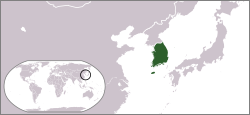Republic of Korea 대한민국 大韓民國 | |||||||||
|---|---|---|---|---|---|---|---|---|---|
| 1960–1961 | |||||||||
| Anthem: 애국가 Aegukga "The Patriotic Song" | |||||||||
| National seal "국새 (國璽)" | |||||||||
 | |||||||||
| Capital | Seoul | ||||||||
| Common languages | Korean | ||||||||
| Government | Unitary parliamentary republic | ||||||||
| President | |||||||||
• 1960–1961 | Yun Bo-seon | ||||||||
| Prime Minister | |||||||||
• 1960 | Heo Jeong | ||||||||
• 1960–1961 | Chang Myon | ||||||||
| Legislature | National Assembly | ||||||||
| House of Councillors | |||||||||
| House of Representatives | |||||||||
| Historical era | Cold War | ||||||||
| 19 April 1960 | |||||||||
| 16 May 1961 | |||||||||
| Currency | hwan | ||||||||
| |||||||||
| Today part of | South Korea | ||||||||
The Second Republic of Korea (Korean: 제2공화국; RR: Je-i Gonghwaguk; lit. "Second Republic") was the government of South Korea from April 1960 to May 1961.
The Second Republic was founded during the April Revolution mass protests against President Syngman Rhee, succeeding the First Republic and establishing a parliamentary government under President Yun Posun and Prime Minister Chang Myon. The Second Republic ended Rhee's authoritarianism and repression, formed a liberal democracy, and formulated the first Five-Year Plans to develop the formerly neglected economy. After thirteen months it was overthrown by the South Korean Army in the May 16 coup led by Park Chung Hee. The Second Republic was replaced by a provisional military government under the Supreme Council for National Reconstruction, leading to the Third Republic of Korea.
The short-lived Second Republic was the only government under a parliamentary system in the history of Korea.


